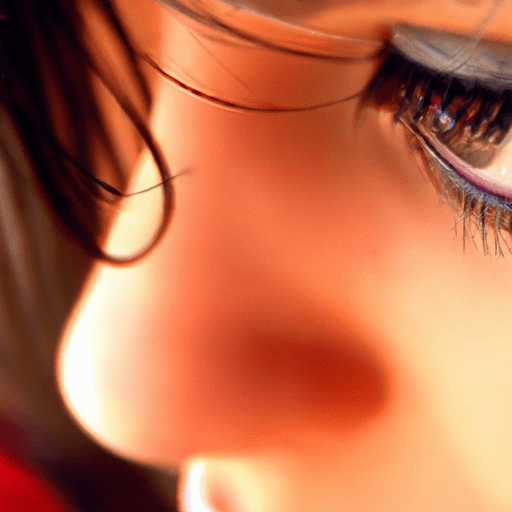Did you know that acne could potentially make your nose appear larger? It may seem surprising, but this is a topic that has garnered attention from individuals who struggle with acne. While acne itself doesn’t physically enlarge your nose, it can contribute to the appearance of a larger nose due to the inflammation and swelling that often accompanies acne breakouts. In this article, we will explore the relationship between acne and the perception of a bigger nose, as well as provide helpful tips to address both acne and any concerns surrounding nose size.
Causes of Acne
Hormonal changes
One of the main causes of acne is hormonal changes in the body. During adolescence, hormonal fluctuations occur, particularly an increase in androgen levels. These hormonal changes stimulate the sebaceous glands to produce more oil, leading to clogged pores and the formation of acne.
Excessive oil production
Another factor that contributes to acne is excessive oil production. This can be caused by various factors such as genetics, hormonal imbalances, or certain medications. When the sebaceous glands produce an excess amount of oil, the pores become blocked, trapping bacteria and dead skin cells. This can result in the development of acne.
Bacteria on the skin
The presence of bacteria on the skin also plays a role in the development of acne. The skin is home to a variety of bacteria, including a strain called Propionibacterium acnes. While this bacteria is normally present on the skin, an overgrowth can occur, leading to inflammation and the formation of acne.
Effects of Acne on the Skin
Inflammation and redness
When acne develops, the skin undergoes inflammation and becomes red and swollen. This is due to the body’s immune response to the presence of bacteria and the production of excess oil. The inflammatory response triggers the release of chemicals that cause the blood vessels in the affected area to dilate, resulting in redness and inflammation.
Formation of pimples and cysts
The most visible effect of acne is the formation of pimples and cysts on the skin. Pimples, also known as papules or pustules, occur when the hair follicles become clogged with oil, bacteria, and dead skin cells. Cysts, on the other hand, are larger and deeper inflamed lesions that can be more painful and take longer to heal.
Scarring
In some cases, acne can leave behind scars on the skin after the pimples or cysts have healed. This scarring occurs when the inflammation caused by acne damages the collagen fibers in the skin, resulting in the formation of depressed or raised scars. These scars can have a lasting impact on the skin’s appearance and texture.

Understanding the Structure of the Nose
Components of the nose
The nose is a complex structure composed of various components. It includes the nasal bones, which form the bridge of the nose, and the nasal cartilage, which provides support and shape to the nostrils and tip of the nose. Additionally, the nose is covered by a layer of skin that protects the underlying structures.
Cartilage and bone
The nasal cartilage and bone give the nose its structure and shape. The cartilage is flexible and allows for movement, whereas the nasal bones provide rigidity to the overall structure. These components work together to maintain the nose’s form and function.
Skin over the nose
The skin covering the nose is unique in its thickness and texture. It is necessary to protect the underlying structures, but it is also prone to various skin conditions, including acne. The skin on the nose is often more oily than other parts of the face, making it more susceptible to clogged pores and the development of acne.
Factors That Can Influence Nose Shape
Genetics
Genetics plays a significant role in determining the shape and size of the nose. Certain genes are responsible for the formation of cartilage and bone structures in the nose. Therefore, individuals may inherit certain nasal characteristics from their parents or other family members.
Ageing
As we age, the nose can undergo changes in shape and size. The cartilage and bone structures may begin to weaken or deteriorate, which can contribute to alterations in nasal appearance. Additionally, the skin loses elasticity with age, which can have an impact on the overall shape of the nose.
Injuries
Trauma or injuries to the nose can also influence its shape. A broken nose, for example, can result in a crooked or misshapen appearance. Injuries can also affect the underlying structures of cartilage and bone, potentially leading to long-term changes in nasal shape.

The Relationship Between Acne and Nose Size
Rumored connection between acne and nose size
There has been a long-standing rumor that acne can make the nose bigger. This belief suggests that the inflammation and swelling caused by acne can permanently alter the shape of the nose. However, this claim lacks scientific evidence and is considered a myth.
Lack of scientific evidence
Despite the common belief, there is currently no scientific evidence to support the notion that acne can permanently change the size or shape of the nose. Acne primarily affects the superficial layers of the skin, and any swelling or inflammation caused by acne is temporary and does not lead to long-term changes in nasal structure.
Impact of Acne on Nasal Appearance
Swelling and redness around the nose
While acne does not directly affect the size of the nose, it can have a temporary impact on nasal appearance. Acne lesions, particularly those located around the nose, can cause swelling and redness in the surrounding area. This can create the illusion of a larger nose, but it is important to remember that this effect is only temporary.
Pimples on and around the nose
Acne breakouts on and around the nose can be particularly noticeable and can draw attention to the area. Pimples, pustules, or cysts that form on the nose can cause discomfort and lead to self-consciousness about nasal appearance. However, it is essential to address the acne itself rather than worry about any potential impact on nose shape.

Temporary Changes in Nose Size
Inflammation and swelling
During a breakout of acne, inflammation and swelling can occur around the nose, leading to a temporary change in size. This swelling is a result of the body’s immune response to the presence of acne-causing bacteria and excess oil. However, once the acne is treated and the inflammation subsides, the nose will return to its normal size.
Nose appears larger due to surrounding acne
The presence of acne lesions on and around the nose can create the illusion of a larger nose. This is primarily because the redness, swelling, and prominence of the acne draw attention to the area. However, it is important to remember that this effect is temporary and does not alter the underlying structure or size of the nose.
Long-Term Effects of Acne on Nose Shape
Possible scarring on the nose
One of the potential long-term effects of severe acne on the nose is the development of scars. Severe acne, such as cystic acne, can cause deep inflammation that damages the collagen fibers in the skin. This can result in the formation of depressed or raised scars on the nose, which can alter its appearance.
Impact of severe acne on overall facial structure
In cases where severe acne is left untreated, it can have a more significant impact on the overall facial structure. Severe and persistent inflammation can lead to the destruction of collagen and underlying tissue, potentially affecting not only the nose but also the surrounding areas. This can result in more pronounced changes in facial appearance.

Treating Acne to Preserve Nose Shape
Consulting a dermatologist
If you are experiencing acne breakouts on or around the nose, it is advisable to consult a dermatologist. A dermatologist can provide personalized treatment recommendations based on your specific skin type and the severity of your acne. They may prescribe topical medications, oral medications, or other targeted treatments to help manage and reduce acne breakouts.
Using appropriate skincare products
Maintaining a consistent skincare routine is crucial for managing acne and preserving the overall health of the skin, including the nose. It is important to choose gentle and non-comedogenic skincare products designed specifically for acne-prone skin. These products should help control excess oil production and unclog pores without causing further irritation.
Possible acne treatments
Depending on the severity of acne, various treatment options are available. These may include topical treatments such as retinoids or benzoyl peroxide, oral medications like antibiotics or hormonal therapy, or more advanced interventions such as laser therapy or chemical peels. Your dermatologist can assess your individual case and recommend the most suitable treatment plan.
Maintaining General Facial Health
Keeping the skin clean and moisturized
To maintain general facial health and prevent acne breakouts, it is essential to keep the skin clean and moisturized. Gently cleanse the face twice a day using a mild cleanser to remove dirt, excess oil, and impurities. Additionally, use a non-comedogenic moisturizer to keep the skin hydrated and balanced.
Avoiding picking or popping acne
As tempting as it may be, it is crucial to avoid picking or popping acne lesions, especially around the nose. Picking at acne can lead to further inflammation, increased risk of infection, and potentially worsen scarring. Instead, allow acne to heal naturally or seek guidance from a dermatologist for safe and appropriate treatment options.





